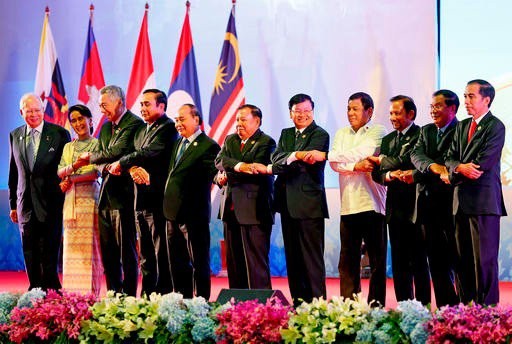ASEAN hedges between Beijing and Tokyo
Change Size
 Southeast Asian leaders link arms at the opening of the 28th and 29th ASEAN Summits and other related summits in the National Convention Center on Sept. 6, 2016 in Vientiane, Laos. (AP/Bullit Marquez)
Southeast Asian leaders link arms at the opening of the 28th and 29th ASEAN Summits and other related summits in the National Convention Center on Sept. 6, 2016 in Vientiane, Laos. (AP/Bullit Marquez)
I
t is an unusual diplomatic "dance." After paying homage to one "suitor," they follow it up soon with a visit to the other.
In recent months, some ASEAN leaders have made visits to China, soon followed by treks to Japan, underlining how they are hedging between both powers as the two compete for influence over ASEAN.
Philippine President Rodrigo Duterte and Myanmar de facto leader Aung San Suu Kyi both chose China over Japan for their first visit to a country outside ASEAN, but dropped in on Japan soon after.
Duterte visited Beijing a week before Tokyo; China was the first and Japan the fifth country outside ASEAN that Suu Kyi went to.
Malaysian Prime Minister Najib Razak met Chinese President Xi Jinping in Beijing two weeks before he met Japanese Prime Minister Shinzo Abe in Tokyo last week.
Singapore Prime Minister Lee Hsien Loong had a bilateral meeting with Xi in Hangzhou on the sidelines of the G-20 summit in early September and visited Tokyo later the same month.
"Diplomatic protocol very often reflects a country's prioritization of national interests," said SIM University East Asia expert Lim Tai Wei, adding that such interests include national security, economic development and alliance obligations.
Japan's wooing of ASEAN is not new — it did so under the "Fukuda Doctrine" of 1977, named after then Prime Minister Takeo Fukuda. This committed Japan as an equal partner to ASEAN in which it pledged to work with ASEAN in areas such as politics and economy.
Subsequent Japanese leaders tended to put ASEAN on the back burner, especially in the decade or so after the 1998 Asian financial crisis, with China stepping up its courtship of ASEAN.
But since taking office in December 2012, Abe has renewed Japan's southbound push with vigor, visiting all 10 ASEAN countries within his first year.
He has offered generous dollops of aid, technology transfer and investment flows to ASEAN states, while seeking support for his pro-active security policy.
This plays well with ASEAN, where four in the 10-nation bloc have conflicting territorial claims with China over the South China Sea.
Despite concerns over unilateral Chinese actions, such as land reclamation in the waterway, Heng Yee Kuang, who teaches international relations at the University of Tokyo, said: "ASEAN states at the same time also recognize the reality of Chinese presence, both in terms of economics and security."
"Smaller countries hedge to maximize the benefits from multiple sources and different major powers, at the same time not being excessively close or overly dependent on any one power," he added.
He noted that while Laos and Cambodia are known to be pro-China, they remain friendly with Japan, which offers them support in infrastructure, human resources and environmental protection.
Research fellow of think-tank Sasakawa Peace Foundation Ippeita Nishida said while China is a key player in Southeast Asia, Abe has been projecting a "continued eagerness to engage in the region... [as] a realist politician with a strategic mind and sound political base at home."
Tokyo has stressed the need to uphold the rule of law — to differentiate itself from China, which has ignored a July international tribunal ruling that invalidates its claims in the South China Sea, said analysts.
Japan's charm offensive has also gone beyond "soft power" means to include military capacity-building.
Heng noted Japan's Self-Defense Forces have "made several historic moves such as training with the Philippine Navy for the first time and sailing into Vietnam's Cam Ranh Bay for the first time." Japan has also given patrol vessels to countries such as the Philippines and Vietnam.
Heng calls this a form of "patrol boat diplomacy," but said the move is largely symbolic. "A few donated patrol vessels cannot match Chinese capabilities to launch more monster 12,000-tonne coast guard patrol cutters."
This article appeared on The Straits Times newspaper website, which is a member of Asia News Network and a media partner of The Jakarta Post






